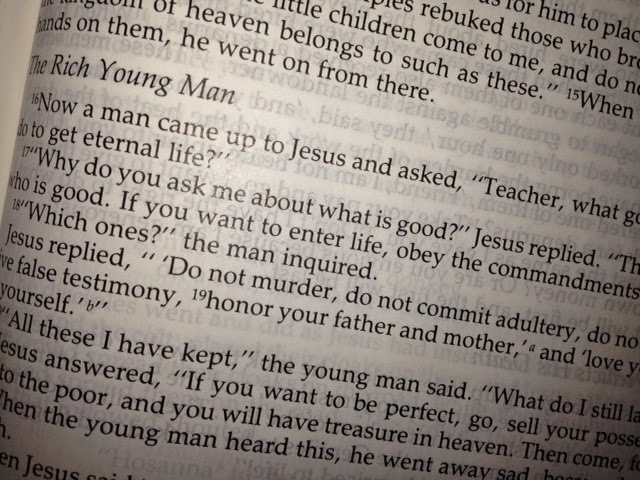Years ago I had the privilege of ghostwriting a book, The Gospel and the Briefcase, for Ted
DeMoss, then the president of CBMC-USA, a ministry to business and professional
people. My task was to create and write the book, using Ted’s personal story
and anecdotes to communicate key principles from his life.
At times in preparing to write about a particular principle in the
book, I would ask him to provide me with specific illustrations. However, since
I had traveled with him on several occasions and heard him speak countless times, I
sometimes simply chose familiar anecdotes – many of them very moving and
dramatic – that Ted had included in his talks.
The end result was a book that read and sounded as if he had
penned every word of it, even though technically I had been the writer. His
wife, Edith, always thought Ted had somehow written the entire manuscript and I
had just done some minor editing. And that’s the way it was intended.
How was I able to do that? I must admit I’ve been gifted
with a good memory – at least in terms of being able to recount the
content of speeches I’ve heard and interviews I’ve conducted. But I also spent
a lot of time with Ted, hearing his stories so often I could practically tell
them as well as he could. I knew his mannerisms, speech inflections, and
personal style so well that I could capture that in “ghosting” his book.
 |
| Can we know Jesus said what He supposedly said? |
I mention this not to commend myself but rather to answer one
of the questions skeptics sometimes pose about the Bible. They ask, “Jesus
never wrote any books, or portions of the Bible. How do we know He actually
said what the Bible claims that He said?” Good question. How do we really know?
In response, I offer my example. After spending much time
with Ted, not only listening to him but also observing his life and forming a
strong, positive relationship with him, I could present in writing his thoughts
and perspectives so accurately even his own wife couldn’t tell the difference.
The four gospels of the Bible – Matthew, Mark, Luke and John
– were written by men who knew Jesus extremely well. Matthew and John were two
of “the twelve” – Jesus’ closest disciples, the men that were with Him round
the clock for three full years. It’s very possible many of their quotations
from Jesus were statements He had made on numerous occasions in different
settings to different groups.
Luke, a physician, was well-educated and very meticulous in
gathering the facts and accounts of Jesus’ ministry. Although he apparently did
not spend time with Him face to face, Luke, being a good medical practitioner,
was methodical and precise in documenting the accounts that appear not only in
the gospel of Luke but also the book of Acts.
The gospel of Mark was written by John Mark, a protégé of
the apostle Paul. After Jesus’ death and resurrection, Paul was welcomed into
the fold with the other apostles who had walked personally with Jesus Christ.
Paul wrote of his own personal, supernatural encounter with Jesus when he was still
known as Saul, the religious zealot. Paul’s life became transformed from
persecutor of Christians to one of Jesus’ most devoted followers, and he invested
deeply in the lives of young men like Mark.
Although their experiences with Jesus were not identical, each
writer knew Jesus intimately and could easily and accurately recount what He
had said. Their writings were not hearsay, like words passed around a circle in
the game called “telephone,” where the final statement bears little likeness to
the original by the time the circuit is complete.
So when we read that Jesus declared, “I am the way, the truth and the life. No one comes to the Father
except through me” (John 14:6), we have confidence that is what He said –
and exactly what He meant.
When physician Luke reports Jesus said, “If anyone would come after me, he must deny himself and take up his
cross daily and follow me” (Luke 9:23), we can trust that seemingly hard
saying of Christ is true and accurate.
When Matthew recounts the so-called Sermon on the Mount,
including statements like, “Love your
enemies, and pray for those who persecute you” (Matthew 5:44), we can be
assured such a revolutionary statement is actually what the former tax
collector heard Jesus say in person, probably on more than one occasion.
And there’s one other element to affirm the veracity of the
words of Jesus in the Scriptures. The Bible says God had direct involvement in
the writing of the 39 Old Testament and 27 New Testament books.
For instance, the apostle Peter – another of Jesus’ 12 closest
followers – wrote, “...no prophecy of Scripture
is a matter of one's own interpretation, for no prophecy was ever made by an
act of human will, but men moved by the Holy Spirit spoke from God” (2 Peter 1:21). And 2 Timothy 3:16 states, “All Scripture is God-breathed and is useful for teaching, rebuking,
correcting and training in righteousness.”
My friend Ted used to tell of meeting with a couple that had
just committed their lives to Christ. He was guiding them through the Bible,
pointing them to passages that would help them in their new spiritual life.
When they came to 2 Timothy 3:16, Ted asked what they thought that meant.
Without hesitating, the wife picked up her Bible and replied, “What it says to
me is, God wrote a book!”
Wise words, from the mouth of a spiritual babe. Yes, God
wrote a book – the Bible. And we can believe and trust in what it says. Even,
and especially, the words of Jesus.
No comments:
Post a Comment